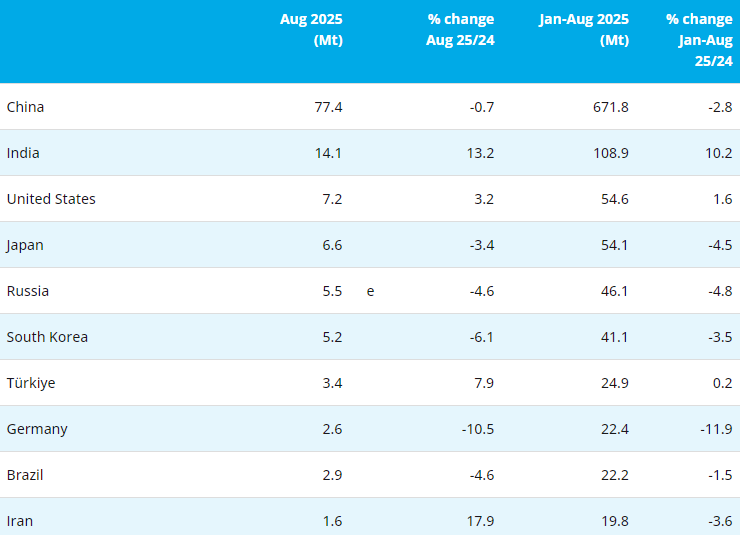
China's imports unexpectedly dropped 2.4 percent year-on-year to $158.63 billion in August, while exports grew 9.4 percent, thanks to recovering demand in the US and Europe, data from the General Administration of Customs showed on Sep 8th.
Markets had expected 3 percent growth in imports. The drop comes on the heels of a 1.6 percent decline in imports for July.
Experts said that the weak import data was largely due to soft domestic demand, as well as falling commodity prices in international markets.
"This [soft domestic demand] is attributable to the continued property market correction and industry overcapacity, which have weighed on property and manufacturing investment, and, hence, import growth," economists from Barclays said in a research note on Monday.
Experts noted that soft import growth is expected to continue in the second half of this year.
"The property sector is not very likely to rebound any time soon, despite many local governments rolling out stimulus policies recently," Xu Hongcai, director of the Department of Information under the China Center for International Economic Exchanges, told the Global Times.
Falling commodity prices also contributed to declining import figures. China imported 610 million tons of iron ore in the first eight months, up 16.9 percent year-on-year, but iron ore prices have dropped by 16 percent on a yearly basis during the period, customs data showed.
"Lower commodity prices means that Chinese companies can do a lot more with lower costs," said Bai Ming, a research fellow at the Chinese Academy of International Trade and Economic Cooperation under the Ministry of Commerce.
Falling crude oil and iron ore prices could save China $5 billion per month on import bills for the rest of this year, according to a Monday research note from Bank of America Merrill Lynch.
In August, China's export volumes totaled $208.46 billion, up 9.4 percent on a yearly basis, sending the trade surplus for the month to a record high of $49.83 billion.
In the long run, a large trade surplus will affect China's ability to benefit from changing global resource allocations, Bai noted.
An expanding trade surplus is also expected to increase China's exchange reserves, which will put upwards pressures on the yuan, and in turn hurt China's exports, economists noted.
In the first eight months of 2014, China imported $1.28 trillion worth of goods, up 0.6 percent year-on-year, while exports for the same period totaled $1.48 trillion, up 3.8 percent.
The EU is still China's largest trade partner. During the period, bilateral trade with the EU increased by 9.9 percent year-on-year, while that with the US grew by 4.4 percent. China's trade with Japan saw a moderate increase of 0.5 percent in the period.
Experts noted that it would be "very difficult" for China to reach this year's 7.5 percent growth target for trade.
Bai noted that decent exports and soft imports are likely to become the "new norm" for trade growth for the second-largest economy, but it is not very likely that the Chinese government will roll out any massive stimulus packages, as that would damage China's ongoing economic restructuring and generate inflationary pressures.
- [Editor:Yueleilei]



 Save
Save Print
Print Daily News
Daily News Research
Research Magazine
Magazine Company Database
Company Database Customized Database
Customized Database Conferences
Conferences Advertisement
Advertisement Trade
Trade















Tell Us What You Think